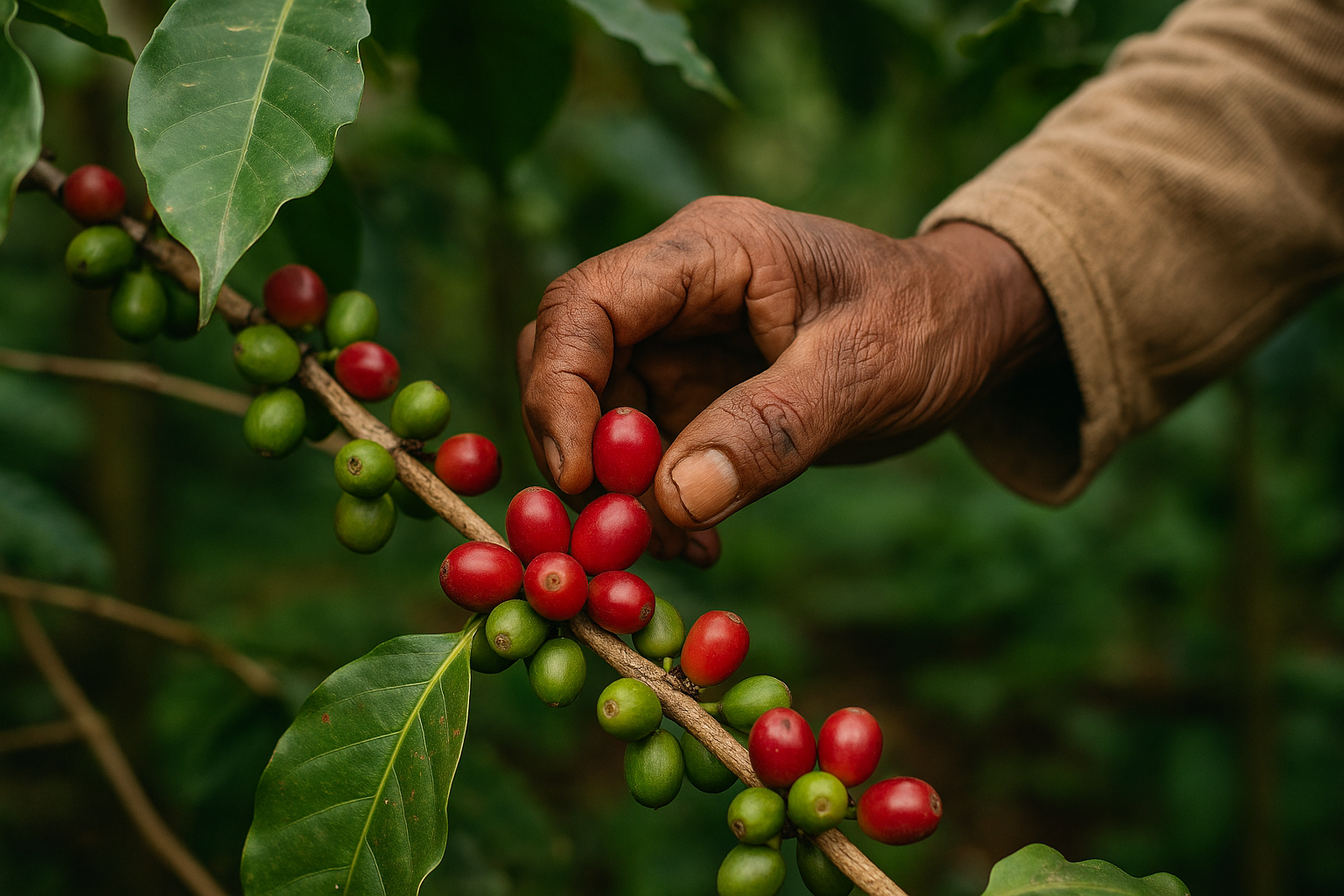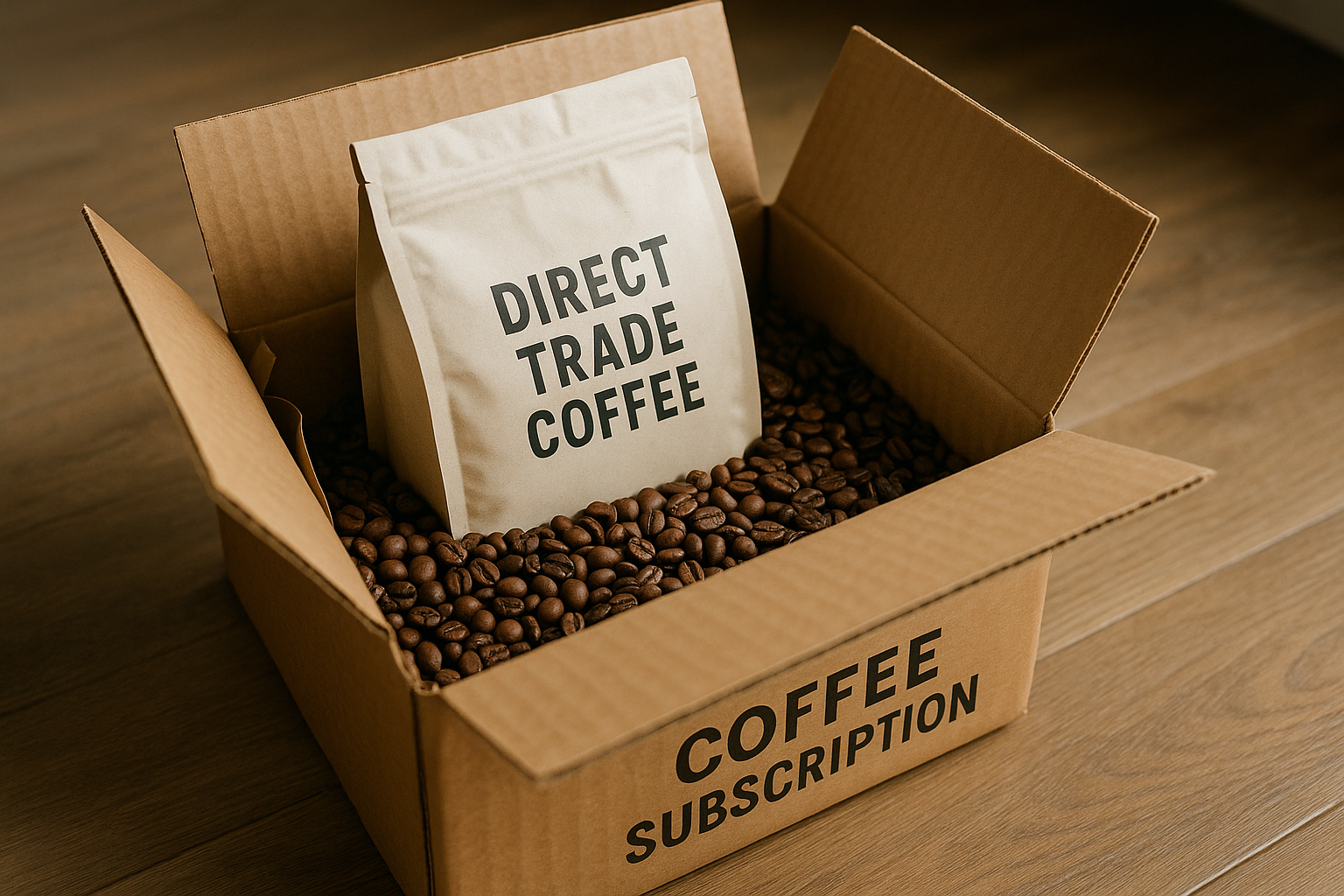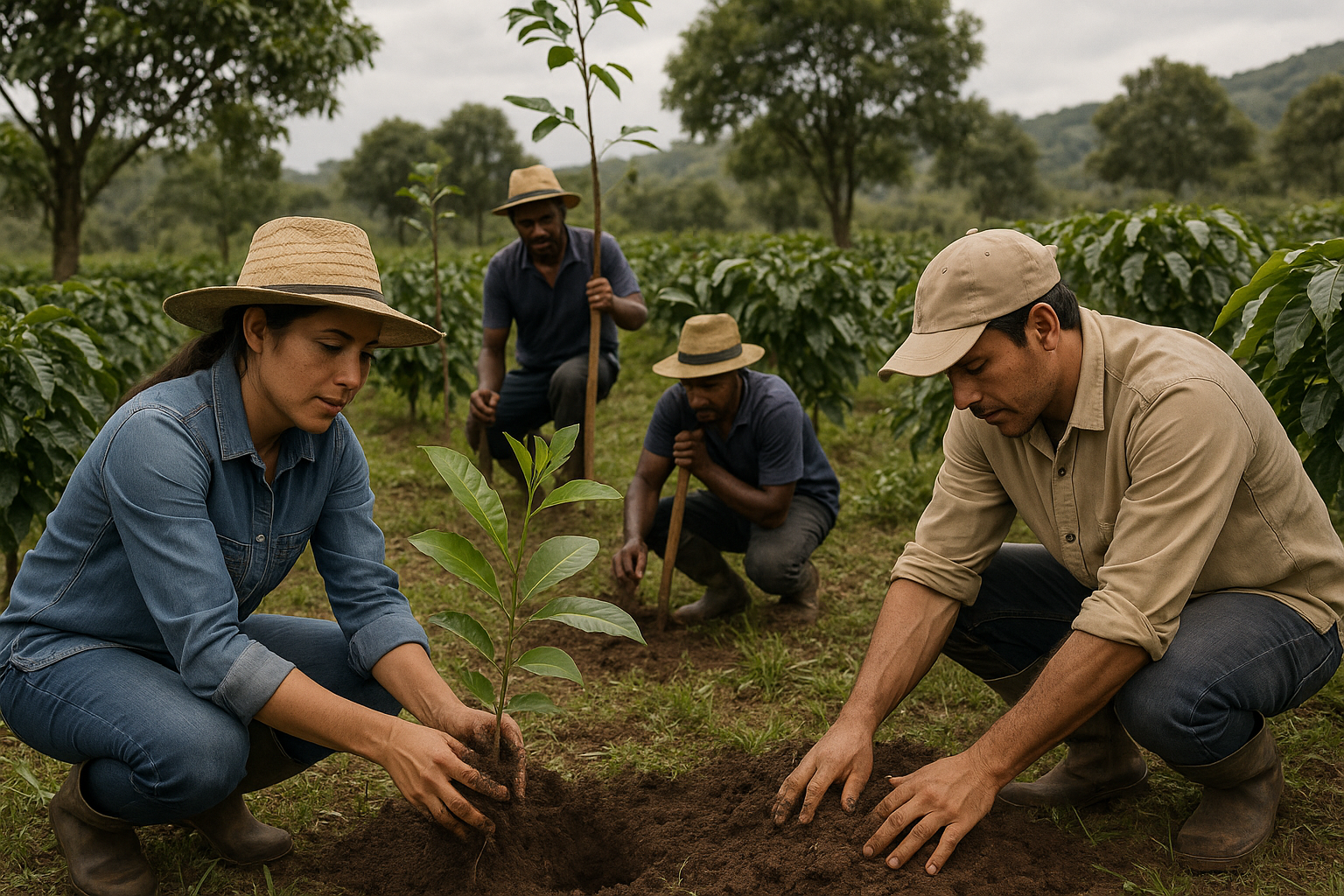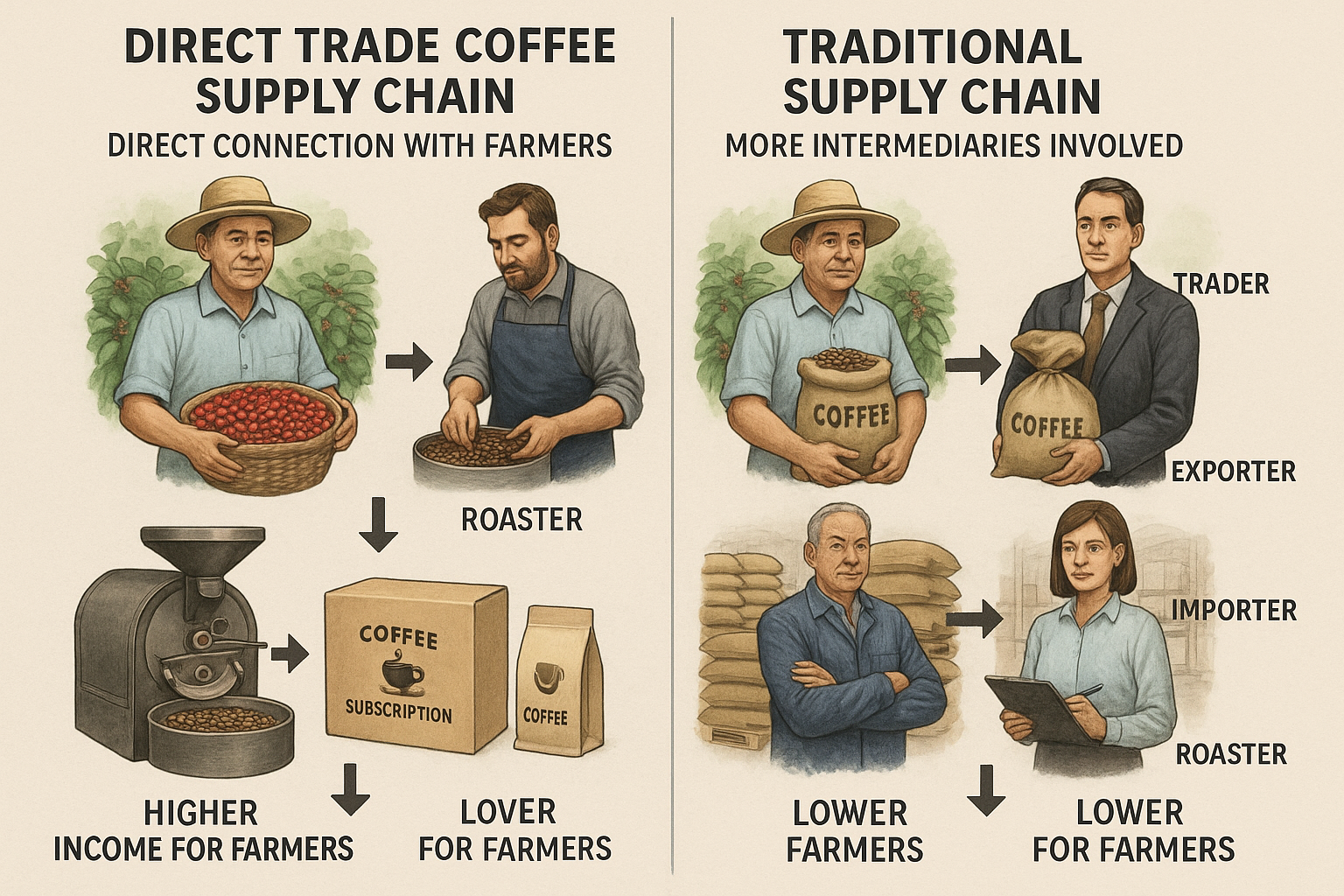TL;DR: A direct trade coffee subscription guarantees fresher coffee and fairer pay for farmers through fewer middlemen. Here's why it's the smarter, ethical choice for coffee lovers.
Everyone knows coffee subscriptions bring fresh beans to your doorstep.
But what makes a direct trade coffee subscription so special?
Here’s a complete guide to the benefits, ethics, and options to help you choose the right subscription.
Some are ethically driven, focusing on fair farmer compensation.
Some emphasize freshness by cutting out intermediaries.
Some offer personalized selections based on your taste.
Some enrich communities with sustainable farming practices.
Some simply deliver convenience without compromise.
Let's dive right in.
What Is a Direct Trade Coffee Subscription?
A direct trade coffee subscription is a service where you get coffee sourced directly from the producers, usually farmers, without intermediaries.
This differs sharply from traditional supply chains where brokers, processors, and large distributors inflate cost and reduce earnings for growers.
With direct trade, roasters work closely with growers to establish transparent pricing, quality standards, and often sustainable practices.
Unlike Fairtrade, which certifies co-ops and sets regional living wages, direct trade focuses on direct relationships and negotiation between roaster and individual farmers or cooperatives.
This approach ensures farmers earn a premium for their craftsmanship — a philosophy that roasters like PT's Coffee Roasting Co. champion, helping fund infrastructure and social programs in coffee communities.

Why Do Coffee Lovers Choose Direct Trade Subscriptions?
Choosing a direct trade coffee subscription ensures you get fresher, higher quality coffee beans roasted to your taste preferences.
Here’s why enthusiasts swear by it:
- Fair compensation: Cutting intermediaries means farmers get a larger share, supporting sustainable livelihoods.
- Exceptional quality: Direct feedback between growers and roasters leads to award-winning, artisan beans.
- Sustainability: Many direct trade farms practice environmentally responsible methods, balancing economy and ecology.
- Traceability: You often receive detailed profiles of the farm, region, and farmer, making each cup more meaningful.
- Customization: Subscriptions commonly include personalized selections based on your flavor preferences.
- Convenience: Fresh coffee is roasted and shipped quickly after harvest, arriving at your door ready to brew.
As Bean & Bean explains, direct trade fosters a transparent, trusting relationship, whereas other programs may have more intermediaries that obscure where the money and quality end up.
How Does a Direct Trade Coffee Subscription Work?
Subscriptions typically function like this:
- You sign up and complete a brief quiz or choose a curated theme based on your flavor and roast preferences.
- The roaster sources your beans directly from cooperatives or farms committed to direct trade principles.
- Coffee is roasted fresh usually within 48 hours of order and shipped via fast ground services.
- You receive a monthly (or custom frequency) delivery of fresh, single-origin, or unique blends.
- You can manage your subscription easily—pause, cancel, swap blends, or adjust delivery timing through a dashboard.
- Customer support often helps tailor your coffee experience further.
For example, Trade coffee subscriptions offer themed and custom options, with guarantees that if you don’t love your first bag, they’ll replace it free.

What Makes Direct Trade Subscriptions Unique from Fairtrade?
While both aim to improve farmer income and ethics, they approach it differently.
Fairtrade is an organization that sets minimum price and labor standards and certifies cooperatives, meaning money goes to co-ops first and distribution to farmers is their responsibility.
Direct trade involves direct purchasing agreements with farmers or cooperatives, often ahead of crop harvest, agreeing on transparent price distribution and quality feedback loops.
Direct trade is often more flexible and personal, allowing for better quality and bigger returns to skilled artisans.
As Bean & Bean notes, Fairtrade creates a baseline; direct trade builds relationships that lead to fine-tuned quality and ethical pay.
What Should You Look for in a Direct Trade Coffee Subscription?
Choosing the right subscription can be overwhelming. Here are crucial factors to consider:
- Transparency: Does the roaster share farm profiles, pricing, and sourcing stories?
- Freshness: Look for companies roasting to order and fast shipping.
- Customization options: Can you tailor your coffee types or adjust deliveries?
- Ethical standards: Are sustainable practices and fair pay explicitly confirmed?
- Flexibility: Ease of pausing, canceling, or switching blends matters.
- Support and guarantees: Customer service and satisfaction guarantees boost confidence.
Trade coffee is well known for its personalized options, fast roasting, and a first-bag satisfaction guarantee—a great example of setting high standards for direct trade subscriptions (source).
How Does Direct Trade Benefit Farmers and Their Communities?
Beyond quality, direct trade coffee subscriptions empower farming communities in profound ways.
Farmers receive premium prices that reflect their skill and dedication, far above commodity rates.
Many roasters commit a portion of revenue to improving farm infrastructure, access to clean water, education, and social programs.
By minimizing middlemen, the transaction is more honest and funds reach producers faster and in greater proportion.
Sustainability efforts improve soil health, reduce pesticide dependence, and protect local ecosystems, ensuring coffee farming remains viable for generations.
This model builds trust and pride among producers seeking to craft award-winning coffee.
PT's Coffee Roasting Co., a pioneer in direct trade, works directly with Latin American farms, ensuring dedicated support for artisan growers and their communities (source).

Can You Expect Freshness and Unique Flavors in a Direct Trade Subscription?
Absolutely. Direct trade subscriptions often source single-origin coffees from distinct regions with unique microclimates and processing methods.
This leads to vibrant flavor profiles rarely found in mass-market blends.
Roasters receive frequent harvest updates, cuppings, and feedback from farmers to fine-tune the roast profile for optimal flavor.
Plus, coffee is roasted soon after order and shipped quickly, preserving aromatic oils and freshness that fade rapidly in generic coffee.
As many subscribers note, the difference in taste is striking—richer, brighter, and more complex than supermarket brands.
Freshness and flavor make every cup a memorable experience worth savoring.
How to Make the Most Out of Your Direct Trade Coffee Subscription?
Here are expert tips to maximize your subscription experience:
- Adjust grind and brewing method for each coffee to highlight distinct notes.
- Explore single-origin offerings — learn flavors from different regions and countries.
- Engage with roasters’ stories—understanding farmer profiles enriches your coffee ritual.
- Review your subscription preferences regularly to tailor delivery speed and quantities.
- Pair your brew mindfully with food or moments to appreciate nuances.
- Use proper storage—airtight, dark containers keep beans fresh longer.
Ever wondered how farmers feel about their direct trade partnerships? Many report increased motivation and recognition, knowing that their craft impacts coffee lovers worldwide. This creates a cycle of improvement and sustainability.
How Does Direct Trade Compared with Fairtrade Impact the Environment?
Direct trade coffee subscriptions often come with a strong commitment to environmental stewardship.
Farmers and roasters prioritize methods that support economic, social, and ecological sustainability.
This can include shade-grown coffee, organic farming techniques, water conservation, and reduced chemical inputs.
While Fairtrade certification includes environmental standards, direct trade allows flexibility for farms to innovate sustainable practices that fit their unique ecosystems.
Supporting a direct trade subscription thus often means contributing to healthier agricultural landscapes that balance productivity and planet care.
Which Are the Best Direct Trade Coffee Subscriptions Available?
There are many quality direct trade subscriptions on the market, so choosing the best depends on your preferences.
Some top choices include:
- Trade Coffee: Known for personalized coffee quizzes, fast roasting, and a first bag guarantee. They source from specialty roasters committed to direct trade principles (source).
- PT's Coffee Roasting Co.: One of the pioneers in direct trade programs with strong ties to Latin American farmers and a passion for sustainable practices (source).
- Bean & Bean: Offers a mix of direct trade and Fairtrade with a variety of artisan beans, including award-winning lots that emphasize ethical sourcing (source).
Each provides flexible subscription models, quality coffee, and ethical sourcing tales.
When picking a subscription, consider roast level, delivery frequency, budget, and how in-depth you want your coffee journey to be.

How Does a Direct Trade Coffee Subscription Compare With Other Subscription Types?
| Feature | Direct Trade Coffee Subscription | Fairtrade Coffee Subscription | Regular Coffee Subscription |
|---|---|---|---|
| Farmer Compensation | Premium prices through direct negotiation, transparent distribution | Baseline living wage set by certification; funds go to co-ops first | Varies; often includes intermediaries reducing farmer share |
| Quality | High; direct feedback enhances bean selection and roast | Good; standards ensure ethical production but less individualized | Broad range; often mass-produced blends |
| Freshness | Roast to order; quick shipping | Varies by brand | Often pre-roasted and stockpiled |
| Sustainability | Often prioritized with tailored practices | Standard environmental criteria | Depends on brand |
| Subscription Flexibility | Highly customizable; pause or swap options common | Depends on provider | Varies widely |
Are There Any Challenges With Direct Trade Coffee Subscriptions?
While the benefits are many, it’s important to understand some challenges:
- Access: Only farmers with certain infrastructure can engage in direct trade effectively.
- Cost: Premium payments for farmers can lead to slightly higher prices for consumers.
- Variety: Less commercial blends mean some beans might not appeal to all palates.
- Scale: Smaller batch sizes may limit availability.
However, most coffee lovers agree these issues are outweighed by quality, ethics, and connection to the coffee’s source.
What Are the Environmental Impacts of Direct Trade Coffee Subscriptions?
Direct trade often correlates with more responsible environmental practices. By funding farmers directly, subscriptions encourage:
- Shade-grown coffee, which preserves biodiversity.
- Reduced chemical usage through organic or low-impact means.
- Water management that protects local watersheds.
- Soil conservation methods that improve long-term farm health.
- Community programs focused on environmental education.
Such eco-conscious approaches ensure coffee farming contributes positively to climate resilience and local ecosystems.
Still wondering if a direct trade coffee subscription is right for you? Consider your values around freshness, quality, ethical consumption, and adventure in taste. This subscription model invites you on a coffee journey that's rewarding beyond the cup.
Can You Customize Your Direct Trade Coffee Subscription?
Yes! Most direct trade subscriptions offer robust customization:
- Select preferred roast levels: light, medium, dark.
- Choose delivery frequency and quantity.
- Pick flavor profiles or specific coffee origins.
- Swap or repeat favorite coffees.
- Pause or cancel anytime for flexibility.
Trade Coffee, for instance, uses a quick quiz to tailor your delivery to personal taste, ensuring each bag is one you’ll savor (source).
Tips for Transitioning to a Direct Trade Coffee Subscription
Switching from grocery store brands to a direct trade subscription is an experience upgrade. Here's how to get started smoothly:
- Start small: Try one monthly bag to adjust your palate.
- Engage with the stories: Learn about the farms and farmers behind your brew.
- Experiment with brewing: Use different methods to explore new flavors.
- Store properly: Keep beans airtight and away from light.
- Join coffee communities: Forums and social media groups can offer tips and pairings.
Above all, enjoy discovering coffee as an artisan experience, not just a routine.

Frequently Asked Questions about Direct Trade Coffee Subscriptions
Q: How is direct trade coffee subscription better than buying coffee from stores?
A: Direct trade subscriptions offer fresher, higher-quality coffee roasted shortly before shipping with transparent sourcing, ensuring farmers earn fair prices (source).
Q: Can I pause or cancel my direct trade coffee subscription easily?
A: Yes, most subscriptions including Trade Coffee allow you to pause or cancel anytime through user-friendly apps or dashboards (source).
Q: Does direct trade guarantee the coffee is organic?
A: Not necessarily. Direct trade emphasizes ethical sourcing and sustainability, but coffee can be organic or non-organic depending on the farm's methods (source).
Q: Are direct trade coffee subscriptions more expensive?
A: They may cost a bit more due to premium quality and fair pay to farmers, but many find the ethical benefits and superior flavor worth the price.
Q: How do I know the coffee is really supporting farmers?
A: Transparency is key. Trusted direct trade roasters share sourcing stories, pricing agreements, and community impact, allowing you to trace your coffee’s journey.
What's Your Next Step?
Tell us in the comments: How will you apply this to your coffee routine? For more fresh insights and engaging coffee content, explore our blog on fresh roasted coffee subscriptions to elevate your mornings.




